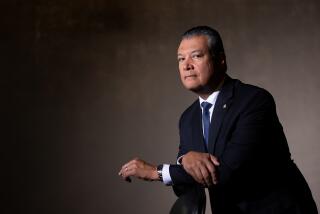Film and TV director Jose Padilha knows violence and corruption in Brazil. That’s why he’s worried

Over the past four years, Brazilians witnessed the impeachment of one president (Dilma Rousseff), the jailing of another (Luiz “Lula” Inacio da Silva) and multiple corruption hearings of yet another (Michel Temer) — all leading to the election of a president who has praised the country’s former military dictatorship and said he would rather have a dead son than a gay son (Jair Bolsonaro).
Toss in a corruption investigation of historic proportions (called “Operation Car Wash”), a record-breaking economic downturn and a Summer Olympics. Only now is the chaotic reality of modern Brazil starting to come into focus.
Perhaps no figure has been so publicly prophetic about Brazil as one of its most famous film and television directors, Jose Padilha.
His work has become such an accurate portrayal of Brazil’s current reality that Mauricio Santoro, a political scientist at of the State University of Rio de Janeiro, joked that the 2010 sequel “Elite Squad: The Enemy Within” — a drama about the Brazilian underworld of drug gangs and corrupt police and politicians — could be mistaken for a documentary.
The Times sat down with the 51-year-old Padilha at the kitchen table in his home in Studio City. There was a lot to discuss:
Violence
“Public security in Brazil is a recurring tragedy,” Padilha said.
He pointed to how past governments in Brazil failed to resolve problems such as extraordinary prison overcrowding.
“Brazil is a state that practices official torture,” he said. “People imagine that violence is caused by misery. But in Brazil, the state creates violent criminals and corrupt police.”
When Padilha created the character Roberto Nascimento — a police captain in “Elite Squad” who tries to take on corrupt cops in Rio de Janeiro — he introduced many Brazilians to the existence of militias comprised of police and former police who collaborate with drug traffickers.
Today, the militias are one of the most powerful criminal forces in the country.
They have been implicated in the 2018 assassination of Marielle Franco, a Rio de Janeiro councilwoman. Another high-profile politician, leftist congressman Jean Wyllys, recently announced he was leaving Brazil because he feared militias.
Some Brazilians criticized Wyllys for that decision, but Padilha said the fear is justified.
Padilha said he ignored the criticism he received when he moved to Los Angeles nearly a decade ago, after he started to receive death threats and police suggested round-the-clock security.
“It wasn’t just threats,” he said. “They tried to kidnap me. They probably would have killed me.”
He said he believes it was retaliation for his movies and the spotlight they were shining on Brazil’s underworld.
“Police run the drug trafficking, and police run the militias,” Padilha said, arguing that the country’s public security system should be rebuilt from scratch.
In a pivotal scene in “Elite Squad,” a trembling Nascimento makes the same case, shouting: “The police must come to an end!”
Corruption
Political corruption also runs throughout Padilha’s oeuvre. His Netflix series on the topic is called “The Mechanism,” his term for the culture of bribery, kickbacks and fraud that pervades Brazil.
Operation Car Wash — which began as a probe into the Brazilian state oil company Petrobas and became one of the biggest corruption investigations in history, implicating more than 80 politicians and business leaders — has been heralded internationally as an important step.
But Padilha says “the mechanism” is still very much alive across the political spectrum.
“Corruption in Brazil doesn’t have ideology,” he said.
He was unsparing in his critique of Brazil’s politicians, starting with Bolsonaro, who was elected last fall on a wave of populism and social conservatism.
“He has always been against individual liberties,” said Padilha, who also pointed to the president’s criticism of homosexuality and his support for relaxing gun control as evidence that he is “unfit for office.”
Ironically, he suspects that the popularity of his movie character Nascimento, a military man unafraid to challenge the status quo, helped Bolsonaro, an ex-army captain who cultivated the same image.
“It seems more and more that people who voted for Bolsonaro imagining they were voting for Captain Nascimento ... have been fooled,” he said. “But let’s see.”
He also slammed Temer, the last president, who was charged with bribery and obstruction of justice during his term and acquitted — but could still face legal trouble now that he is out of office.
“I think he committed those crimes, yes,” Padilha said. “And I think he will end up in prison.”
Not that Padilha had any love for the left either.
He reserved some of his most scathing criticism for Lula, who is serving a 12-year prison sentence for money laundering related to one of his properties but who remains popular in some circles.
“I love my leftist artist friends, but the obvious fact is that Lula was the captain of a huge corruption scheme,” Padilha said.
He also expressed deep dissatisfaction with Fernando Haddad, a member of Lula’s party who ran against Bolsanaro and lost — and who Padilha said he suspected “would have tried to weaken the Car Wash investigation, to try to free Lula and others.”
Padilha said that he was so disgusted with the choices for president last October that he didn’t vote.
The future
For Padilha, the real test of Brazil’s future under Bolsonaro is how the president handles a scandal involving his own son, Flavio Bolsonaro.
Hundreds of thousands of dollars were deposited into his bank accounts with no clear explanation, and he was found to have employed the mother and the wife of an alleged militia member.
“The Bolsonaro government was elected with the mandate of the Brazilian population to strengthen the Car Wash corruption investigation,” Padilha said. “Now his son is implicated.”
The president must allow his son to be investigated, he said.
As for dealing with crime, Padilha opposes Bolsonaro’s plan to increase the number of citizens who are armed.
“I am in favor of fewer guns, period,” he said.
Padilha remains deeply pessimistic about Brazil’s ability to escape its past and emerge into an era in which his feature films no longer feel like documentaries.
And his own future?
Among his many current projects is a documentary about the the legalization of marijuana in California.
He said he has no plans to make another “Elite Squad.”
Sims is a special correspondent.
More to Read
Sign up for Essential California
The most important California stories and recommendations in your inbox every morning.
You may occasionally receive promotional content from the Los Angeles Times.










